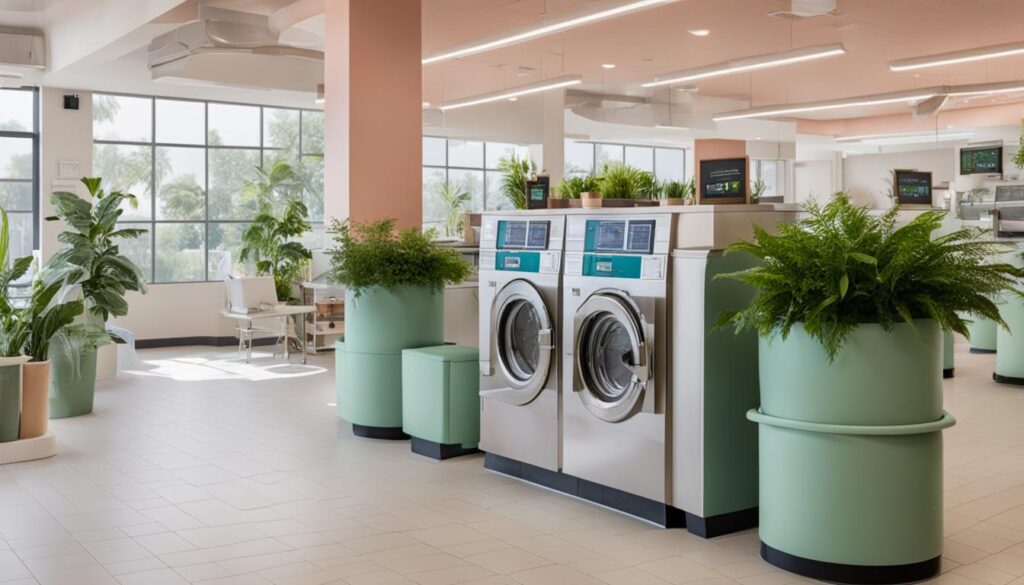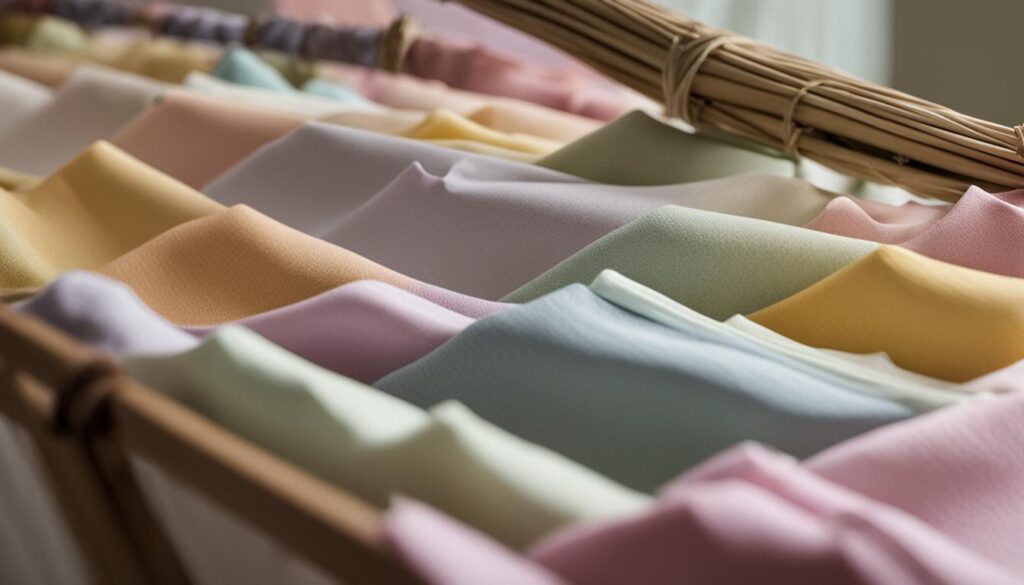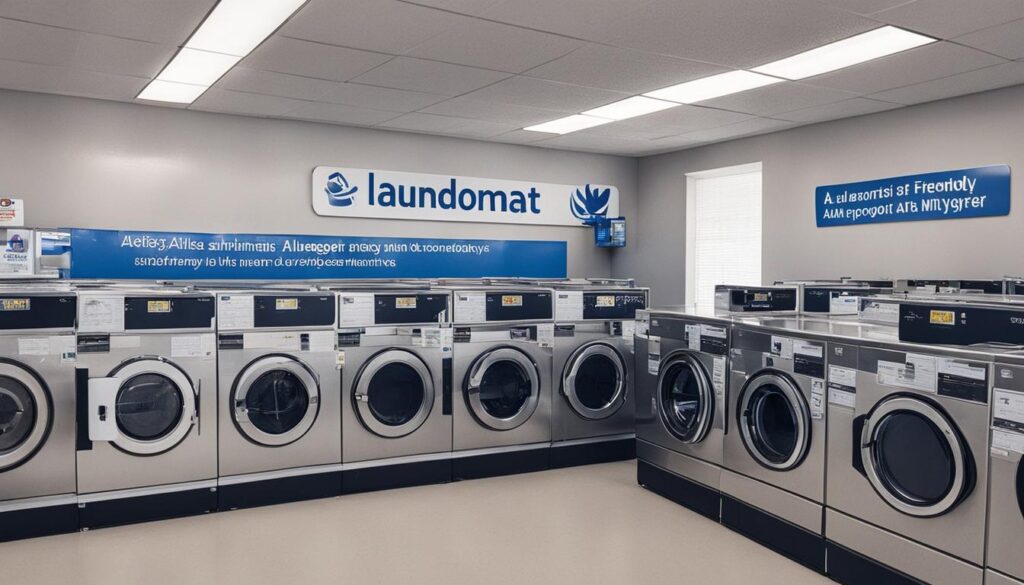Living with allergies can be challenging, and it’s important to consider every aspect of your environment, including your laundry routine. In this article, we will explore essential tips and solutions for creating an allergy-friendly laundromat experience. Whether you have sensitive skin or suffer from allergies like asthma, these recommendations will help protect your skin and respiratory health.
Key Takeaways:
- Choose hypoallergenic detergents designed for sensitive skin to minimize irritants and allergens.
- Read labels carefully to avoid harsh chemicals, artificial fragrances, and dyes in laundry detergents.
- Consider running an extra rinse cycle to thoroughly remove detergent residue from your clothes.
- Avoid fabric softeners that may contain chemicals and fragrances that can trigger allergies.
- Utilize allergen-neutralizing products and high heat drying options to create an allergy-friendly laundromat.
Choose Hypoallergenic Detergents
One of the key steps in creating an allergy-friendly laundromat is choosing hypoallergenic detergents. Look for products specifically labeled as hypoallergenic or designed for sensitive skin. These detergents minimize irritants, fragrances, and dyes that commonly trigger allergies. Opt for natural and eco-friendly alternatives that are gentle on both your skin and the environment.
When it comes to allergy-friendly laundry services, selecting the right detergent is crucial. By choosing hypoallergenic detergents, you can minimize the risk of skin irritation and allergic reactions caused by harsh chemicals and fragrances. These gentle formulas are designed to safely cleanse your clothes without compromising your health.
Avoiding toxic chemicals isn’t just beneficial for your skin, it’s also better for the environment. Non-toxic detergent laundromats prioritize eco-friendly alternatives that reduce pollution and minimize their impact on aquatic life.
When searching for hypoallergenic detergents, keep an eye out for products certified by organizations such as the National Eczema Association or the Asthma and Allergy Foundation of America. These certifications provide additional assurance that the product meets specific hypoallergenic standards.
Hypoallergenic detergents are formulated to be free of common allergens and potential irritants found in traditional laundry detergents. They are less likely to cause skin sensitivities, making them an excellent choice for individuals with sensitive skin or allergies.
When using hypoallergenic detergents, it’s important to follow the recommended dosage and guidelines provided by the manufacturer. Using excessive amounts of detergent can leave residue on your clothes, leading to potential skin reactions. Always measure the appropriate amount according to the load size and follow the instructions on the detergent packaging.
Read Labels Carefully
When it comes to choosing the right laundry detergents for an allergy-friendly laundromat, reading labels carefully is crucial. The ingredients in laundry detergents can have a significant impact on our skin and respiratory health, particularly for those with sensitivities and allergies. To ensure the safety and well-being of our customers, we prioritize the use of hypoallergenic and non-toxic detergent options.
Hypoallergenic laundry services use detergents that are specifically formulated to minimize skin irritants, fragrances, and dyes that commonly trigger allergies. By opting for hypoallergenic detergents, we can provide a gentler and safer laundry experience for individuals with sensitive skin.
“Choosing hypoallergenic detergents is essential for creating an allergy-friendly laundromat.”
Non-toxic detergent laundromats prioritize the use of natural and eco-friendly ingredients. These detergents are free from harsh chemicals, artificial fragrances, and dyes that can irritate the skin and exacerbate allergies. By selecting non-toxic detergents, we ensure that your clothing is thoroughly cleaned without compromising your health or the environment.
“Our non-toxic detergent options allow us to offer a safer and healthier laundry experience.”
Why Choose Hypoallergenic Detergents?
Hypoallergenic detergents offer several key benefits for individuals with allergies or sensitive skin:
- Reduced Risk of Irritation: The absence of irritants, fragrances, and dyes in hypoallergenic detergents minimizes the risk of skin irritation and allergic reactions.
- Gentle on Sensitive Skin: Hypoallergenic detergents are formulated to be gentle on sensitive skin, making them suitable for individuals with conditions such as eczema or dermatitis.
- Safe for Allergy-Prone Individuals: By using hypoallergenic detergents, we create an environment that is more suitable for those with common allergies, such as pollen or pet dander.
What to Look for in Laundry Detergent Labels
When selecting laundry detergents, it’s essential to pay close attention to the information provided on the labels. Here are some key factors to consider:
- Ingredients: Avoid detergents that contain harsh chemicals, artificial fragrances, and dyes. Opt for natural ingredients and hypoallergenic formulas.
- Certifications: Look for certifications such as asthma & allergy friendly® or eco-friendly labels to ensure the detergent meets industry standards.
- Fragrance-Free: Choose detergents that are labeled as fragrance-free to minimize the risk of skin irritation or respiratory issues.
By carefully reading labels and selecting the right detergents, we can create an allergy-friendly laundromat that prioritizes your health and well-being.
Double Rinse for Thorough Removal
To ensure that all traces of detergent are thoroughly removed from your clothes, consider running an extra rinse cycle. This step is particularly important for individuals with sensitive skin who are more prone to adverse reactions. Double rinsing can help reduce the risk of skin irritation and allergies caused by detergent residue.
When it comes to creating an allergy-friendly laundromat, proper rinsing is key. By taking the extra step to double rinse your clothes, you can ensure that all detergent residues are completely removed. This is especially beneficial for individuals with sensitive skin who may experience adverse reactions to even small amounts of detergent left on their clothes.
Here’s why double rinsing is important for sensitive skin:
- Eliminates detergent residues: Double rinsing helps to eliminate any leftover detergent residues, which can potentially irritate sensitive skin. By completely rinsing out the detergent, you can minimize the risk of skin irritation and allergies.
- Reduces contact with irritants: Double rinsing ensures that your clothes are thoroughly cleansed, reducing the contact of potential irritants with your skin. This can be particularly beneficial for individuals with conditions such as eczema or dermatitis.
- Enhances comfort: By removing all traces of detergent, double rinsing can help ensure that your clothes feel more comfortable against your skin. This can be especially important for individuals with sensitive skin who may experience itching, redness, or other discomfort due to detergent residues.
To double rinse your clothes, simply run an additional rinse cycle after the initial wash cycle. This will help remove any remaining detergent from your clothes, leaving them clean and free from potential irritants.
Remember, creating an allergy-friendly laundromat involves paying attention to every step of the laundry process. By incorporating double rinsing into your routine, you can help minimize the risk of skin irritation and allergies caused by detergent residues.
“Double rinsing ensures that your clothes are thoroughly cleansed, reducing the contact of potential irritants with your skin.”
Avoid Fabric Softeners
Fabric softeners may leave your clothes feeling soft and smelling fresh, but they often contain chemicals and fragrances that can trigger allergies. Instead, opt for natural alternatives like white vinegar, which can help soften clothes without the added irritants. By avoiding fabric softeners, you can create a more allergy-friendly laundromat experience.
When it comes to laundry, fabric softeners are a common addition for many people. However, these products can contain chemicals and fragrances that may irritate sensitive skin or trigger allergies. If you or someone in your household has allergies or sensitive skin, it’s important to choose alternatives that are gentle and hypoallergenic.
An excellent natural alternative to fabric softeners is white vinegar. While it may seem unconventional, white vinegar is an effective substitute for conventional fabric softeners. Not only does it help soften your clothes, but it also helps remove any residual detergent, leaving your laundry fresh and clean.
To use vinegar as a fabric softener, simply add half to one cup of white vinegar to the rinse cycle of your washing machine. The vinegar will not only soften your clothes but also act as a natural deodorizer, eliminating any lingering odors. Plus, vinegar is cost-effective and environmentally friendly.
By eliminating fabric softeners from your laundry routine and opting for natural alternatives like white vinegar, you can create a more allergy-friendly laundromat experience. Your clothes will still come out soft and fresh without the potential irritants that can affect sensitive skin or trigger allergies.
Opt for Allergen-Neutralizing Products
In order to create an allergy-friendly laundromat, it’s essential to consider using laundry additives that are specifically designed to neutralize allergens. These products can be particularly beneficial for households with pet dander or pollen allergies, helping to create a more allergy-friendly environment.
One option to consider is the Allersearch Allergen Wash, which is specifically formulated to reduce allergens in your laundry. It effectively removes common allergens like dust mites, pet dander, and pollen, ensuring that your clothes are free from potential triggers.
Another product that can help neutralize allergens is Allerpet. Allerpet is specially designed to be used on clothing and bedding and works by denaturing the proteins found in allergens like pet dander. By using Allerpet, you can effectively reduce allergens in your laundry and create a more allergy-friendly environment.
By incorporating these allergen-neutralizing products into your laundry routine, you can significantly reduce the presence of allergens in your clothes and create a healthier, more allergy-friendly laundromat experience.
Hot Water and High Heat Drying Options
When it comes to creating an allergy-friendly laundromat, utilizing hot water and high heat drying options can make a significant difference. Let’s explore how these methods can help eliminate allergens from your clothes.
Killing Dust Mites and Removing Allergens
Washing your clothes in hot water, preferably above 130°F or 54°C, can effectively kill dust mites and remove allergens. Hot water can penetrate deep into the fabric, breaking down and removing irritants that can trigger allergies. By washing your clothes in hot water, you can achieve a thorough cleaning that helps create an allergy-friendly environment.
To complement the washing process, using high heat in the dryer can further eliminate allergens from your clothing. By subjecting your clothes to high temperatures, you can effectively kill any remaining dust mites or allergens that may have survived the washing cycle. It’s important to note that not all fabrics can withstand high heat, so always check the care labels on your clothing before using high heat drying.
By implementing hot water and high heat drying options, you can significantly reduce allergens in your laundry, creating a more asthma-friendly and allergy-friendly laundromat experience.
Regularly Clean Your Washing Machine
In order to maintain an allergy-friendly laundromat, it is crucial to regularly clean your washing machine. Mold and mildew can accumulate in the drum, detergent drawer, and rubber seal, which may worsen allergies. Cleaning your washing machine on a routine basis will help keep it fresh and free from allergens.
There are two effective methods you can use to clean your washing machine:
- Hot Water Cycle with Vinegar: Start by running an empty hot water cycle in your machine. Add two cups of white vinegar to the detergent compartment or directly into the drum. The vinegar will help eliminate mold, mildew, and any detergent residue.
- Specialized Washing Machine Cleaner: Alternatively, you can use a specialized washing machine cleaner. These products are designed specifically to remove dirt, grime, and allergens from your machine. Follow the manufacturer’s instructions for the best results.
Regular Cleaning Schedule
It is recommended to clean your washing machine at least once every three months, or more frequently if you notice any signs of mold, mildew, or unpleasant odors. Additionally, if you have sensitive skin or allergies, consider cleaning your machine more often to minimize allergen exposure.
Tips for Cleaning Your Washing Machine:
- Wipe down the drum, detergent drawer, and rubber seal with a clean cloth or sponge to remove any visible dirt or residue.
- Leave the door and detergent drawer open after each use to allow air circulation and prevent moisture buildup.
- Remove lint and debris from the lint filter or trap regularly to prevent clogs and maintain optimal machine performance.
- Consider using a descaling product to remove mineral deposits and improve the efficiency of your washing machine.
By following these cleaning practices, you can ensure that your washing machine remains allergen-free and contributes to a healthier laundry experience.
| Method | Benefits |
|---|---|
| Hot Water Cycle with Vinegar | – Helps eliminate mold, mildew, and detergent residue – Cost-effective and easily accessible – Natural and chemical-free option |
| Specialized Washing Machine Cleaner | – Specifically formulated to remove dirt, grime, and allergens – Convenient and easy to use – Provides a deep clean for your machine |
Dust Your Laundry Room
To create an allergy-friendly laundromat, it’s important to keep the area around your washing machine clean and free of dust. Regularly dust surfaces and wipe them down to prevent the accumulation of allergens. By maintaining a clean laundry room, you can minimize the risk of allergen exposure during the laundry process.
Household dust often contains various allergens, such as dust mites, pollen, pet dander, and mold spores. These particles can easily settle on surfaces in your laundry room and cling to your clothes during the washing and drying cycles. By reducing dust in your laundry room, you can create a more comfortable and allergy-friendly environment for everyone.
Dusting surfaces in your laundry room should be a routine task. Start by dusting the top surfaces, such as shelves, cabinets, and the top of your washing machine and dryer. Use a damp cloth or a microfiber duster to capture the dust effectively. Be sure to pay attention to corners and crevices where dust tends to accumulate.
After dusting, wipe down all the surfaces with a mild cleaning solution or all-purpose cleaner. This will help remove any remaining dust particles and other potential allergens that may be present. Pay special attention to the detergent dispenser and the outer drum of your washing machine, as these areas can accumulate residue and dust over time.
Remember to also clean the lint trap in your dryer regularly. Built-up lint can harbor dust and reduce the efficiency of your dryer. Remove the lint trap and clean it thoroughly to ensure optimal performance.
Creating a clean and dust-free laundry room is essential for individuals with allergies and sensitivities. By taking proactive measures to reduce dust and allergens, you can create a more pleasant and allergy-friendly environment for your laundry routine.
| Benefits of Dusting Your Laundry Room |
|---|
| 1. Minimizes allergen exposure during laundry |
| 2. Reduces the risk of allergic reactions |
| 3. Creates a cleaner and more comfortable space |
| 4. Improves the performance of your washing machine and dryer |
By incorporating regular dusting and cleaning into your laundry room maintenance routine, you can ensure an allergy-friendly environment and promote better respiratory health for yourself and your family.
Store Clean Laundry Properly
After your laundry is clean, it’s essential to store it properly in a clean and dry place. Avoid leaving clean clothes exposed in a dusty or damp environment, as this can reintroduce allergens. By storing your laundry correctly, you can maintain an allergen-free environment and ensure that your clothes remain fresh and clean.
One effective way to store clean laundry is by using airtight storage containers or zippered garment bags. These containers and bags help create a barrier between your clothes and potential allergens, such as dust mites or pet dander.
It’s also important to maintain a clean and organized wardrobe or closet. Regularly dust and vacuum your storage area to minimize the presence of dust and allergens. Consider using HEPA filters in your vacuum cleaner to capture even the smallest particles, ensuring a clean environment for your stored clothes.
When arranging your clothes, group them by type and season. This organization method enables better airflow and makes it easier to locate specific items without disturbing other garments. Be sure to keep winter clothes separate from summer clothes to prevent cross-contamination of allergens.
Additionally, avoid using scented sachets or mothballs in your storage area. These products often contain strong fragrances that can cause allergic reactions. Instead, opt for natural alternatives like lavender sachets or cedar chips, which repel insects without triggering allergies.
In summary, properly storing clean laundry is crucial in maintaining an allergy-friendly laundromat experience. By utilizing airtight containers, organizing your wardrobe, and avoiding scented products, you can create a clean, allergen-free environment for your clothes.
Use Allergen-Proof Covers
Invest in allergen-proof covers for your pillows and mattresses to create an asthma-friendly laundromat experience. These covers act as a barrier and prevent allergens such as pet dander or dust mites from settling into your bedding, reducing the risk of allergen exposure. By using allergen-proof covers, you can create a cleaner and healthier environment for both yourself and others who may have allergies.
There are a variety of allergen-proof covers available in the market, designed specifically to keep allergens at bay. Look for covers that are labeled hypoallergenic and allergy-friendly to ensure their effectiveness. These covers are typically made of tightly woven fabric that prevents even the smallest allergen particles from passing through.
It’s recommended to cover not only your pillows and mattresses, but also your duvets and comforters. This comprehensive approach ensures that your entire sleep setup remains free from allergens. Remember to wash your covers regularly, following the manufacturer’s instructions, to maintain their effectiveness.
Choosing allergen-proof covers is an important step in creating an asthma-friendly laundromat. By investing in these covers, you can significantly reduce the presence of allergens in your bedding, providing a clean and healthy sleep environment.
Benefits of Using Allergen-Proof Covers:
- Prevents allergens from settling in your bedding
- Reduces the risk of allergen exposure
- Maintains a cleaner and healthier environment
- Fits pillows, mattresses, duvets, and comforters
Investing in allergen-proof covers is an effective way to create an asthma-friendly laundromat experience. These covers act as a protective barrier, preventing allergens from infiltrating your bedding and minimizing the risk of allergic reactions. By using allergen-proof covers, you can enjoy a cleaner and healthier sleep environment.
Tips for Maintaining a Healthy Home
In addition to creating an allergy-friendly laundromat, there are other measures you can take to maintain a healthy home. By implementing these tips, you can further protect your family from allergens and create a safer environment.
Regularly Wash Bedding and Clothes in Hot Water
Washing your bedding and clothes in hot water can help eliminate dust mites, pet dander, and pollen. Hot water above 130°F (54°C) effectively kills these allergens, reducing the risk of exposure. Make it a routine to wash your items in hot water to maintain a healthy living space.
Maintain Humidity Below 50% in Your Laundry Room
High humidity levels can promote mold growth, which can worsen allergies and asthma symptoms. To prevent mold, ensure that the humidity in your laundry room stays below 50%. You can use a dehumidifier or open windows and doors to improve ventilation.
Take Advantage of Table and ELDERLY?
| Tip | Description |
|---|---|
| Wash bedding and clothes in hot water | Hot water kills dust mites, pet dander, and pollen |
| Maintain humidity below 50% in the laundry room | Prevents mold growth and allergen accumulation |
Incorporating these tips into your home maintenance routine can significantly reduce allergen exposure and create an asthma-friendly laundromat environment. Remember to regularly wash your bedding and clothes in hot water and keep the humidity in your laundry room under control. By following these practices, you can ensure a healthier living space for you and your family.
Recommended Allergy-Friendly Products
We understand the importance of creating an allergy-friendly laundromat experience. To help you make informed choices, we have curated a list of recommended products that prioritize allergen removal and cater to both allergy and asthma concerns.
1. Renegade’s SWEAT-X Free and Clear Laundry Detergent
This detergent has earned the asthma & allergy friendly® certification, demonstrating its effectiveness in removing pet and dust mite allergens. With its gentle yet powerful formula, SWEAT-X Free and Clear ensures a thorough and allergy-friendly laundry experience.
2. All Free Clear Liquid
Designed specifically for sensitive skin, All Free Clear Liquid is a reliable choice for an allergy-friendly laundromat. Its hypoallergenic formula is free from irritating dyes and fragrances, making it suitable for those with allergies or skin sensitivities.
3. Arm & Hammer Sensitive Skin Free & Clear
Arm & Hammer’s Sensitive Skin Free & Clear detergent is another excellent option for individuals seeking a hypoallergenic solution. This gentle detergent effectively removes stains and odors without compromising on performance or causing skin irritations.
4. Seventh Generation Free & Clear Laundry Detergent
If you’re looking for an eco-friendly choice, Seventh Generation’s Free & Clear Laundry Detergent is a great option. It combines cleaning power with a commitment to sustainability, delivering an allergy-friendly laundry experience that’s gentle on the environment.
5. Dropps Sensitive Skin & Baby Detergent
Dropps offers the convenience of easy-to-use pods with their Sensitive Skin & Baby Detergent. These pre-measured pods are formulated to be gentle on sensitive skin while effectively cleaning your laundry, ensuring an allergy-friendly laundromat experience.
6. Molly’s Suds Laundry Detergent Powder
For those who prefer powdered detergents, Molly’s Suds provides a gentle and effective option. Their Laundry Detergent Powder is free from harsh chemicals and is suitable for individuals with allergies or sensitive skin.
These recommended products have been carefully selected to meet the standards of an allergy-friendly laundromat. Choose the option that best suits your needs, and enjoy a laundry routine that prioritizes allergen removal and promotes a healthier living environment.
| Product | Features |
|---|---|
| Renegade’s SWEAT-X Free and Clear Laundry Detergent | Earned asthma & allergy friendly® certification |
| All Free Clear Liquid | Hypoallergenic formula, free from dyes and fragrances |
| Arm & Hammer Sensitive Skin Free & Clear | Gentle and effective, safe for sensitive skin |
| Seventh Generation Free & Clear Laundry Detergent | Eco-friendly, free from harmful chemicals |
| Dropps Sensitive Skin & Baby Detergent | Convenient pods, gentle on sensitive skin |
| Molly’s Suds Laundry Detergent Powder | Gentle and effective powdered detergent |
Conclusion
Creating an allergy-friendly laundromat is essential for individuals with sensitivities and allergies. By following the tips and recommendations in this article, you can make your laundry routine safer and healthier.
Choosing hypoallergenic detergents is the first step towards an allergy-friendly laundromat. Look for products specifically labeled as hypoallergenic or designed for sensitive skin. These detergents minimize irritants, fragrances, and dyes that commonly trigger allergies.
Additionally, using allergen-neutralizing products can further enhance the allergy-friendliness of your laundromat. Consider laundry additives like Allersearch Allergen Wash or Allerpet, which effectively reduce allergens in your laundry. These are especially beneficial for households with pet dander or pollen allergies.
To maintain an allergy-friendly laundromat, it’s crucial to keep your laundry room clean and dust-free. Regularly clean your washing machine to prevent the build-up of mold and mildew, and dust surfaces to minimize allergen exposure. Properly storing clean laundry in a clean and dry place is also important to avoid allergen reintroduction.
Remember to always consider the specific needs of your household and select products that are certified as hypoallergenic or allergy-friendly. By implementing these steps, you can create an environment that promotes safer and healthier laundry practices for individuals with sensitivities and allergies.
FAQ
What kind of detergent should I use in an allergy-friendly laundromat?
Choose hypoallergenic detergents specifically designed for sensitive skin. Look for products labeled as hypoallergenic or gentle on skin to minimize irritants and allergens.
How can I ensure that all traces of detergent are removed from my clothes?
Consider running an extra rinse cycle to thoroughly remove detergent residue. Double rinsing can help reduce the risk of skin irritation and allergies caused by leftover detergent.
Can I use fabric softeners in an allergy-friendly laundromat?
It’s best to avoid fabric softeners as they often contain chemicals and fragrances that can trigger allergies. Instead, opt for natural alternatives like white vinegar to soften your clothes without added irritants.
Are there any products that can neutralize allergens in my laundry?
Yes, there are laundry additives available that can effectively reduce allergens in your clothes. Look for products like Allersearch Allergen Wash or Allerpet, especially if you have allergies to pet dander or pollen.
Should I wash my clothes in hot water?
Washing your clothes in hot water (above 130°F or 54°C) can effectively kill dust mites and remove allergens. Similarly, using high heat in the dryer can further eliminate allergens from your clothing.
How often should I clean my washing machine?
It’s important to regularly clean your washing machine to prevent the buildup of mold and allergens. Run a hot water cycle with vinegar or use a specialized washing machine cleaner to keep your machine fresh and allergen-free.
How can I maintain a clean laundry room?
Regularly dust surfaces and wipe them down to prevent the accumulation of allergens in your laundry room. By keeping the area clean, you can minimize the risk of allergen exposure during the laundry process.
How should I store clean laundry to prevent allergen exposure?
Store clean laundry in a clean and dry place to avoid reintroducing allergens. Avoid leaving clean clothes exposed in a dusty or damp environment.
Can I use allergen-proof covers for my pillows and mattresses?
Yes, using allergen-proof covers for pillows and mattresses can help create an allergy-friendly environment. These covers prevent allergens from settling into your bedding, particularly if you have allergies to pet dander or dust mites.
What other measures can I take to maintain a healthy home?
In addition to creating an allergy-friendly laundromat, regularly washing your bedding and clothes in hot water can help reduce exposure to allergens. Keeping humidity below 50% in your laundry room is also important to prevent mold growth.
Are there any recommended allergy-friendly products?
Yes, Renegade’s SWEAT-X Free and Clear Laundry Detergent, All Free Clear Liquid, Arm & Hammer Sensitive Skin Free & Clear, Seventh Generation Free & Clear Laundry Detergent, and Dropps Sensitive Skin & Baby Detergent are excellent options for their hypoallergenic formulas. Another gentle powder option is Molly’s Suds Laundry Detergent Powder.







